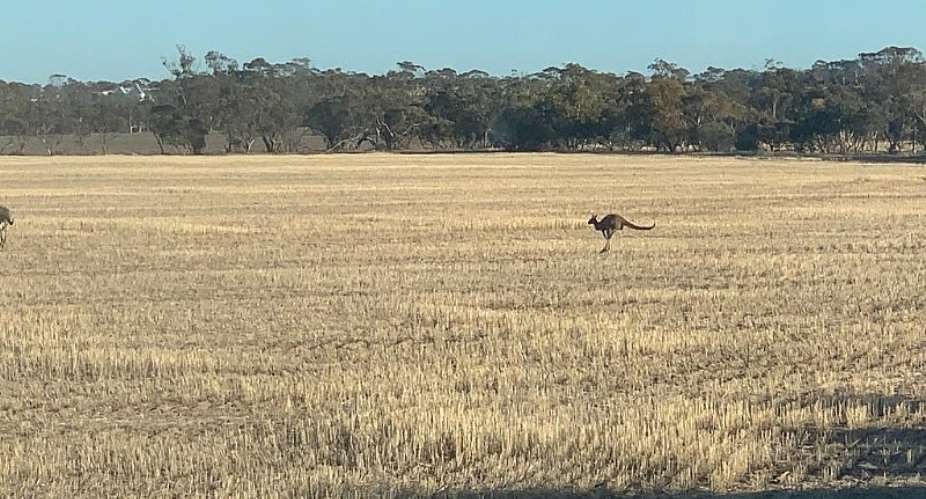Diplomatic shots have been fired in a spiralling trade row between Australia and China, amid Canberra's push for an independent global inquiry into the Coronavirus pandemic.
Australian calls for a "comprehensive, independent and impartial" investigation into the origins and spread of Covid-19 drew overwhelming support at the World Health Assembly; the motion passed earlier this week with the backing of more than 130 countries.
But victory at the WHA appears to have come at a crippling cost. On Monday, China slapped hefty tariffs of more than 80 percent on Australian barley imports for the next 5 years. It was a devastating blow to local grain growers, and hit just days after a Chinese ban on beef from several Aussie meat exporters.
"A direct political response"
Beijing's decision to impose barley tariffs came amid accusations that Australia was breaching "anti-dumping" regulations, claims staunchly denied by Canberra.
Instead, experts say China is punishing Australia for spearheading the global charge for a Coronavirus probe. "There is a very clear link," Peter Jennings from the Australian Strategic Policy Institute told RFI. "The timing is no coincidence, the tariffs are a direct political response from China".
In 2019 Chinese barley trade was worth AUD 600 million (€359 million), making the Sleeping Giant Australia's most lucrative market.
Third generation farmer Tim O'Meehan, who grows barley and wheat in Amelup, Western Australia, told RFI he was extremely disappointed. "It was a shock that was difficult to take in," he said, adding that he was halfway through the planting season when the news broke, so hastily switched to planting wheat. "It's destroyed 70 to 80 percent of our business".
Australian wine next in the firing line
As reeling barley farmers attempt to sell their grain elsewhere, the rift has sounded the alarm for other Australian producers (wine, wool, dairy, seafood etc.) who rely heavily on the Chinese market. The latest tensions have fuelled concerns that they could be targeted next - especially in the wake of the Chinese ambassador alluding to a consumer boycott.
According to Australian Grape & Wine CEO Tony Battaglene, nearly half of Australia's total wine exports end up in China (40 percent - well ahead of the USA and the UK, the second and third biggest markets, at 14 and 12 percent respectively). For Tyrrell's Wines, one of the country's oldest and most renowned wineries, exports to China rake in around half a million Australian dollars (€300,000) per year, and the country represents nearly 20 percent of cellar door business. Managing director and fourth generation winemaker Bruce Tyrrell is keeping a close eye on the situation. "No one wants to get tied up in trade wars, there are no winners."
But the spat could be an opportunity for Australia to learn a valuable lesson. "This country really needs to diversify and reduce its economic dependence on China, we've grown lazy and complacent," Jennings said. "The Chinese are helping us in a way - because their attitude right now is so offensive that we're realising that we need to distance ourselves from them".
However, new markets pose their own problems. Western Australian barley farmer Michael Fels produces 600,000 tonnes of the grain per year, with up to 90 percent sold to China. "Of course there are other markets, but they just don't pay as well," he said. "Everything we do revolves around Chinese buyers, so this is going to have a big impact on our profitability".
Caught in the middle
Australia's Agriculture Minister David Littleproud has downplayed suggestions of a trade war with China, and has also denied that the tariffs have anything to do with Australian calls for a review into the disease which has so far killed more than 328,000 people worldwide.
Barley growers are pinning their hopes on a tariff resolution through the World Trade Organization (WTO), although Canberra will first attempt to hammer out a diplomatic solution before taking the case to the global trade umpire.





 Tuesday’s downpour destroys ceiling of Circuit Court '8' in Accra
Tuesday’s downpour destroys ceiling of Circuit Court '8' in Accra
 SOEs shouldn't compromise on ethical standards, accountability – Akufo-Addo
SOEs shouldn't compromise on ethical standards, accountability – Akufo-Addo
 Father of 2-year-old boy attacked by dog appeals for financial support
Father of 2-year-old boy attacked by dog appeals for financial support
 Jubilee House National Security Operative allegedly swindles businessman over sa...
Jubilee House National Security Operative allegedly swindles businessman over sa...
 Nobody can order dumsor timetable except Energy Minister – Osafo-Maafo
Nobody can order dumsor timetable except Energy Minister – Osafo-Maafo
 Mahama wishes National Chief Imam as he clock 105 years today
Mahama wishes National Chief Imam as he clock 105 years today
 J.B.Danquah Adu’s murder trial: Case adjourned to April 29
J.B.Danquah Adu’s murder trial: Case adjourned to April 29
 High Court issues arrest warrant for former MASLOC Boss
High Court issues arrest warrant for former MASLOC Boss
 Align academic curriculum with industry needs — Stanbic Bank Ghana CEO advocates
Align academic curriculum with industry needs — Stanbic Bank Ghana CEO advocates
 Election 2024: We'll declare the results and let Ghanaians know we've won - Manh...
Election 2024: We'll declare the results and let Ghanaians know we've won - Manh...
